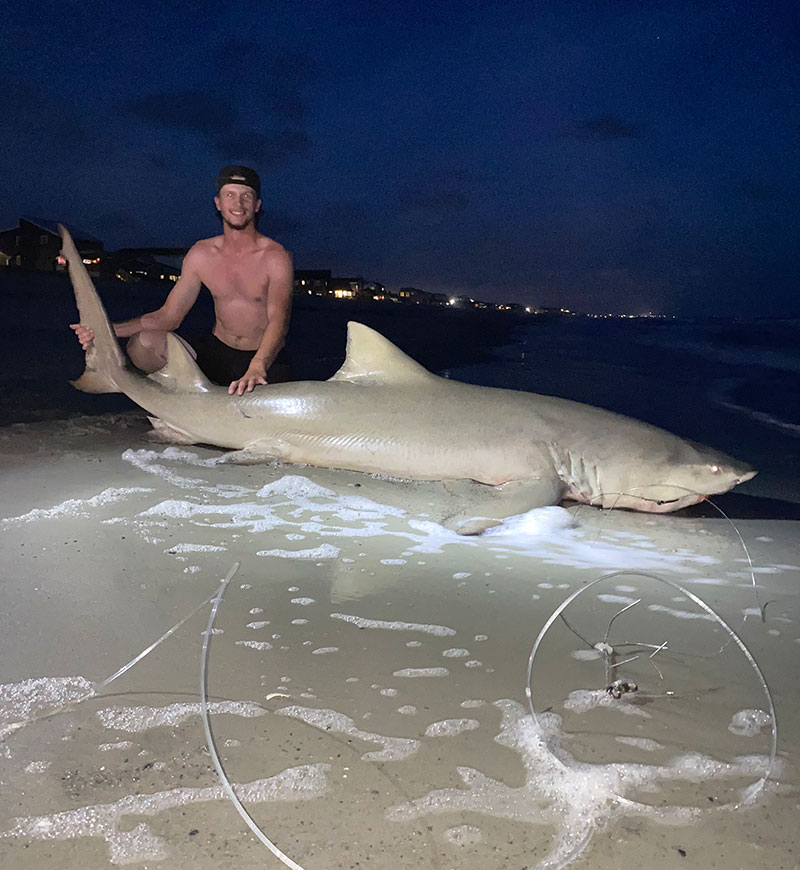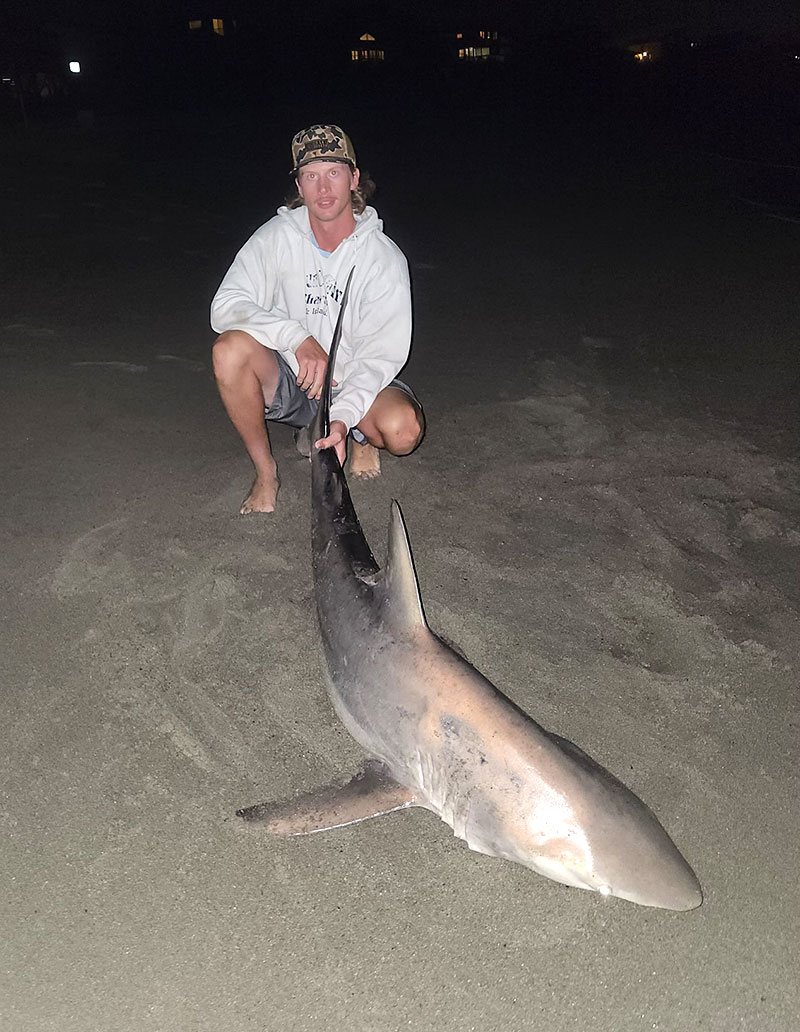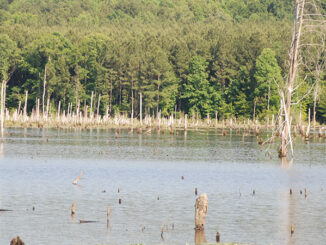
Shark fishing has a bad reputation in a lot of circles. People who don’t know the ins and the outs of it either immediately think of Captain Quint from the movie JAWS, or they envision bloodthirsty cowboys slaughtering any species of shark in the ocean they can.
Shark fishing can be nothing like what is shown by popular culture and the media. When done right, it’s a ton of fun, and can help you beat the mid-summer blues in the Carolinas, even if you don’t have a boat.
Jeff McLean lives in Avery County and gets to fish some of the state’s prettiest (not to mention most productive) mountain trout water on the Elk River. But his true angling love is wrangling big coastal sharks in shallow water. He is by no means a shark killer. Actually, McLean has been deputized by NOAA to tag and release these sharks, and he volunteers his efforts so that NOAA can learn more about them. It’s a family affair too, as he involves his father and his two sons, Myles and Maxton, in his shark capture, tag and release efforts.
McLean has gone as far south as Florida to take classes in the best practices for this fishery. But the bulk of his shark fishing takes place in the Carolinas. When July hits, chances are you can find him either on a pier that allows shark fishing, or on a deserted beach at night, when these predators can be caught in droves.
Tons of fun
McLean is quick to dispel the notion that sharks are generally not fun to target with rods and reels. He explained that from a boat, in deep water, most species of sharks dive deep immediately when they realize they are hooked, making for just a lot of weight at the end of the line.
But from a pier or the beach, where nearly all of his bites come in 3 to 5 feet of water, sharks don’t have the option of going deep. So they are almost forced to run. This makes for a completely different battle.
He has caught plenty of these creatures from boats. But McLean said he prefers fishing from a fixed position ten times over. Of course, different species of sharks fight differently, and experienced shark anglers can often tell the species from the first few moments after a solid hookup.
Bulls and hammerheads are the strongest, lemon sharks give up the easiest, and the acrobatics of spinners and blacktips make them the most fun.
Tackle-wise, he fishes mostly 50W and 80W Penn International offshore trolling reels, spooled almost entirely with braid, on offshore rods. He is a big fan of Bloodline leader systems, which feature equal lengths of 200-pound mono leading to 400-pound stranded cable, which the shark can’t roll on and kink off like single strand wire. In the past, he used shorter leaders, but has gone to a 10-foot length to keep from getting tail whipped.

The leader terminates in a circle hook. His favorite baits for this type of fishing are any species of tuna head, whole stingrays, or live bait when it is available.
A biodegradable balloon (many experienced sharkers swear by yellow) is then used to suspend the bait off the bottom. Depending on the tide, the balloon can be on the main line itself or get worked well up the leader towards the hook. Then it’s just a question of when and where to deploy the rig.
July is prime time
McLean loves mid-summer nights, making July the prime time for sharking in the Carolinas.
Whether he’s on a shark-legal pier in South Carolina or fishing an empty beach on a barely inhabited island on North Carolina’s Outer Banks, he wants a hot night with the wind blowing from the beach out to sea, which eliminates the use of any kind of anchor rod or system.
He’s looking for some freedom of movement with his bait. He drops that bait in just behind the breakers, which is the general strike zone at night. If any sharks are around, it generally isn’t long before the reel starts screaming. He has had initial runs of up to 900 yards from sharks in this shallow water, so at first you hang on, all the while digging in to do battle.
When a bigger shark is hooked off a pier, the rod has to come down to the beach to land the shark without injuring it, which makes it a team affair. You’re probably going to get wet and sandy when you do this. That’s all part of the experience.
The end game is the tricky part. Even with all his instruction and experience, McLean is quick to admit that he has been bitten several times, so caution is key.
Sharks are extremely dangerous predators, and most attacks occur when they are being bothered in some way or another. Hooking and beaching them, even for noble purposes, certainly counts as bothering them. You simply can’t allow a shark to get in striking range of you, so it is best to approach a large beached one from the rear. He said he has “ridden” many a shark as he de-hooks it and tags it. He’ll also tell you that getting whacked by a large shark’s tail can cause a lot of damage. This is not an activity for the faint of heart. Proceed with caution.
McLean performs “shark surgery” as quickly as he safely can. This consists of removing the circle hook and affixing the NOAA tags. But sometimes, a bit more is required. He has removed as many as 4 additional hooks from a shark’s mouth. If he feels like he can safely pull it out, he does so.
Hooks will rust out eventually, but it’s much better for the survivability of the shark to remove what you can. When the shark is ready to go back, McLean scoots it back into the breakers, where they usually dart off as soon as the water is deep enough. All that’s left is to send the tag data in. McLean has done this enough that he has earned the nickname “The Shark Whisperer,” probably from a friend who saw him “ride” one and pull out a few old rigs.
Is shallow sharking for you? Maybe or maybe not. It’s a bit of a niche fishery, to be sure. It has an elevated level of risk. But just about any type of fishing has risks attached to it. You get to make the decision on whether you participate in this. Just don’t skip out on a fun summer night of shark fishing because of any stigma already attached to it.
Hook up, hang on:
When sharks are hooked in shallow water from the beach, they can’t run straight down into deep water, so they go on drag-screaming runs. That’s when the angler has to dig his heels in, literally, and fight the shark in as it tires.




Be the first to comment